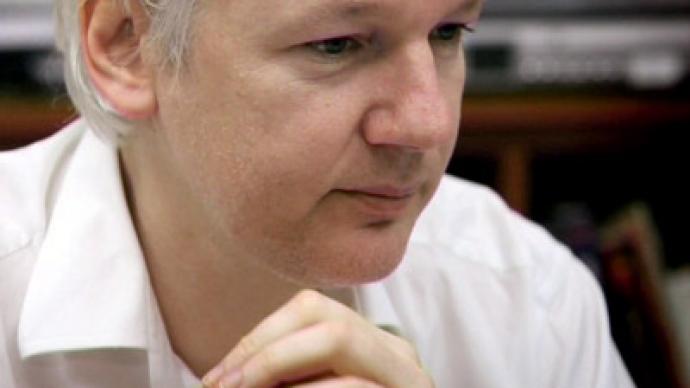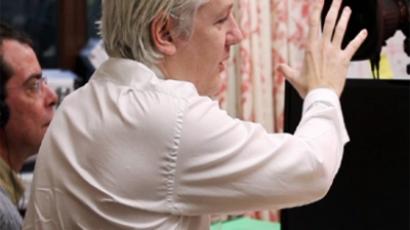Smear & Loathing: Assange show FSB-filmed Putin propaganda

Watched Julian Assange’s show on RT and dying to express your outrage? The World Tomorrow host compiled a list of hateful notions he encourages journalists and public figures to use.
Julian Assange’s interview with Hezbollah leader Sayyid Nasrallah sparked a wave of media reaction and saw Twitter trends soar. While the general public expressed their interest in what Nasrallah had to say in his first interview since 2006, the media pounced on Assange accusing him of… Actually Assange beat them to the punch, saying it all before the show was even launched.
RT’s interview with Assange from April, 16:“[They will say] there’s Julian Assange, enemy combatant, traitor, getting into bed with the Kremlin and interviewing terrible radicals from around the world,” he told RT. “But I think it’s a pretty trivial kind of attack on character.”
In order to avoid subjecting them to trivialities, Assange decided to lend a “helping hand to the overworked hacks in the anti-Assange ‘smearsphere’ by indulging in a pre-emptive bout of self-hating WikiLeaks-bashing.”“Corporate media and regime propaganda machines alike excel in the mass production of sensationalist smears against individuals and organisations they perceive to be social, political or economic competition. Fortunately WikiLeaks is all three,” his statement reads.Since he is tired of “the lack of imagination and poor sense of humor evinced by journalists and public figures,” Assange decided “to hold out an olive-branch to our overworked detractors, by writing higher quality smears for them.”Here are just a few: #2.1 Assange is a Kremlin patsy, employed by the Kremlin, the show is propaganda, editorially controlled by Putin and filmed by the FSB!#2.4 Assange is desperate, marginalized pariah, rightly rejected by the Western media. The only people who will work with him are US-hating Russians!#2.6 Assange is only interested in money – the Kremlin must have paid him big bucks!#5.8 Assange can’t hold a conversation for more than 26 minutes!#5.9 Assange won’t shut up for the entire 26 minutes!Although this was clearly a joke, it seems like Assange was not far off the mark. Reading the actual reviews of The World Tomorrow, one cannot help but notice the exact same sentiments being expressed. No joke this time.“RT, first known as Russia Today, is an English-language news network created by the Russian leader Vladimir V. Putin in 2005 to promote the Kremlin line abroad. It’s like the Voice of America, only with more money and a zesty anti-American slant,” writes Alessandra Stanley of The New York Times.“Russia Today – now styled RT – is state-owned and Kremlin-controlled. It is remarkable for how little reporting it devotes to what is going on inside Russia today,” opines The Guardian’s Luke Harding. “The mystery is why Assange should agree to become a pawn in the Kremlin's global information war. Perhaps he needs the money.”American former television host Glenn Beck went into an all-out hysterical 10 minute rant about the show.“The fact that this guy has been hired by Russia is amazing!” he exclaimed. “The implication is Assange is a Russian agent whose anti-American mission is now out in the open for all to see.” Whatever the conclusions Western media drew from the Assange show’s premiere, they are definitely not in tune with their readers. Most of them lashed out right back at the journalists in the comments sections.“Ooh, you really have a problem with Mr. Assange don't you?” reads a comment on The Guardian website. “I notice you don't bother with the shortcomings of the Western press of which you are a part. Do you really suppose that you bother with the uncomfortable truths either?”“Russia Today might not be everyone's cup of tea, however it does provide a platform for honest journalists and commentators.”“Calling RT a ‘Kremlin propaganda channel’ putting a bit strongly. My guess is calling the BBC ‘Westminster propaganda channel’ would be nearer the truth.”“RT is often propaganda, yes, but it happens to be right about half the time. It is an appropriate counterpoint to Western propaganda, which is about as likely to come from the pages of The Guardian, responsible for selectively censoring numerous WikiLeaks cables in accordance with the interests of the UK government and corporations.”“I'm glad to hear what Hassan Nasrallah, too bad we don't get to hear it from US reporters,” a reader comments on the New York Times article.“This report is not up to the usual NYT standards…Stanley sounds a bit vindictive.”“[Assange] did an excellent job and gave viewers an opportunity to hear the point of view of someone that no American media (including NYT) would ever do.”“At RT, Mr. Assange has joined a team of journalists extraordinaire. These journalists take meaningful events of the day, separate the wheat from the chaff, and report the news.”
'Saying what no one wants to hear'
Journalist Glenn Greenwald thinks there is apparent hypocrisy in the way some US media treat Assange, who is doing the job they are supposed to do.“The model of the US media is to show loyalty to the US government,” he told RT. “They have long loathed Julian Assange, really, since he first came on the scene. And it was really amazing given what he did: bring about transparency – it’s supposed to be what they do…There’s really a lot of irony and hypocrisy in this criticism.”Anti-war activist and journalist Don Debar told RT the media storm caused by Assange’s show is predictable. Debar argues whistle-blowers and alternative sources of media present a major problem to the US “information management paradigm.”“In the United States, since the 1950s, and famously in April of 1961 when John F. Kennedy called on the media to consider their stories against the issue of national security, you have a very, very narrow band of opinion that gets broadcast, discussed, and a very narrow set of facts that are presented.”As the information age has brought international news outlets to American audiences that are not “bound by censorship,” DeBar maintains the fact the US communication industry “is beating up on Assange on the one hand and RT on the other isn’t surprising.”RT and Assange explained prior to the premiere that the purpose of the show is to bring alternative opinions to viewers around the world and stimulate debate of issues the mainstream shuns. The controversy over the first episode is proof positive that the goal has been achieved.














